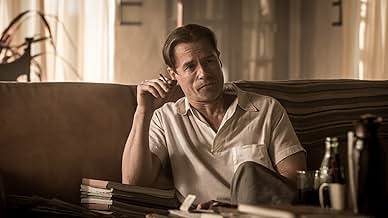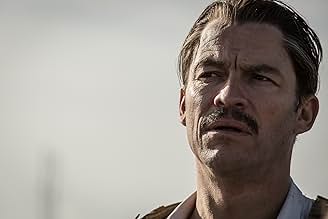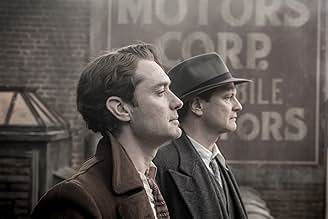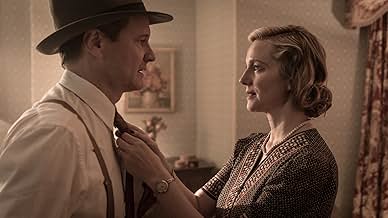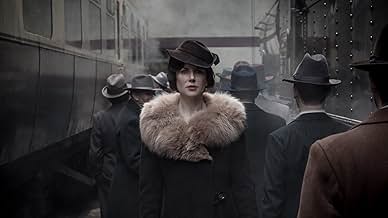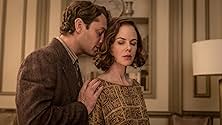Genius
- 2016
- Tous publics
- 1h 44min
NOTE IMDb
6,5/10
22 k
MA NOTE
Une chronique de l'époque de Max Perkin du temps où il occupait le poste de rédacteur en chef chez Scribner, où il supervisa des travaux de Thomas Wolfe, Ernest Hemingway, F. Scott Fitzgeral... Tout lireUne chronique de l'époque de Max Perkin du temps où il occupait le poste de rédacteur en chef chez Scribner, où il supervisa des travaux de Thomas Wolfe, Ernest Hemingway, F. Scott Fitzgerald et d'autres.Une chronique de l'époque de Max Perkin du temps où il occupait le poste de rédacteur en chef chez Scribner, où il supervisa des travaux de Thomas Wolfe, Ernest Hemingway, F. Scott Fitzgerald et d'autres.
- Réalisation
- Scénario
- Casting principal
- Récompenses
- 1 victoire et 6 nominations au total
Angela Sant'Albano
- Bertha Perkins
- (as Angela Ashton)
Ray Strasser King
- James, Mailroom Clerk
- (as Ray Strasser-King)
Avis à la une
7vsks
Director Michael Grandage's movie Genius about the relationship between legendary Scribners editor Maxwell Perkins and flamboyant author Thomas Wolfe has received generally tepid reviews. I for one am delighted an editor is finally receiving some screen time! Wolfe was an author whose moods, enthusiasms, and output were not easily corralled, even by someone with Perkins's experience. After all, he'd brought works to the public from other outsized personalities and authors with personal difficulties—notably Ernest Hemingway and F. Scott Fitzgerald.
It's easy to imagine the slammed door that would greet an author today who showed up with a 5,000-page manuscript as Wolfe did with his second book, Of Time and the River. The challenging task of turning this into a readable manuscript epitomizes the editor's dilemma, as Perkins puts it, "Are we really making books better, or just making them different?" Getting 5,000 pages down to a still-hefty 900 made it different, all right. And better, at least in the sense of more likely to be read, too.
Colin Firth, as Perkins, keeps his hat on during almost the entirety of the movie, symbolic perhaps of how his character tried to keep a lid on his difficult author. Jude Law as Wolfe is by turns outrageous, contrite, drunk, and sentimental. Pretty much like the novels, actually. His performance is consistent and always interesting. He shows Wolfe as a man with a lot of words bottled up inside him who couldn't always control the way they poured out.
It's odd to see an all-British and Australian cast playing so many titans of American literary history, including Perkins and Wolfe, Guy Pearce as Fitzgerald, and Dominic West as Hemingway. (The Hemingway scene necessitated an ending credit for "marlin fabricator.") The women in the lives of the protagonists are Laura Linney as Mrs. Perkins, perfect as always, and Nicole Kidman, who believably portrays the obsessed Mrs. Bernstein. She's left her husband to cultivate and promote the much younger Wolfe and is not lacking a flair for the dramatic herself.
The movie is based on the National Book Award-winning Perkins biography by A. Scott Berg, transformed into a screenplay by John Logan. New Yorker critic Richard Brody dings the script for its departures from the detailed and more richly peopled original, including the book's fuller explanation for the rupture between Wolfe and Scribners. While I disagree with some critiques of the filmed story, Brody says a lawsuit and Wolfe's unsavory political views played a part, and leaving the latter out seems a mistake. A fuller exploration of the break-up could have put some meat on the bones.
Portraying in cinema an intrinsically intellectual and abstract enterprise is difficult (The Man Who Knew Infinity struggled with the same challenge.) Like me, reviewer Glenn Kenny at Roger Ebert.com apparently had not read the book, so did not have Brody's reservations. Kenny found "the exchanges between editor and author exhilarating. Logan's script . . . is invested in the craft of words like few other movies nowadays, even those ostensibly about writers." Wolfe blasted onto the American literary scene like a runaway train and left it before he could accomplish a judicious application of the brakes. Yet, he eventually realized who'd kept him on track, as his moving deathbed letter attests.
It's easy to imagine the slammed door that would greet an author today who showed up with a 5,000-page manuscript as Wolfe did with his second book, Of Time and the River. The challenging task of turning this into a readable manuscript epitomizes the editor's dilemma, as Perkins puts it, "Are we really making books better, or just making them different?" Getting 5,000 pages down to a still-hefty 900 made it different, all right. And better, at least in the sense of more likely to be read, too.
Colin Firth, as Perkins, keeps his hat on during almost the entirety of the movie, symbolic perhaps of how his character tried to keep a lid on his difficult author. Jude Law as Wolfe is by turns outrageous, contrite, drunk, and sentimental. Pretty much like the novels, actually. His performance is consistent and always interesting. He shows Wolfe as a man with a lot of words bottled up inside him who couldn't always control the way they poured out.
It's odd to see an all-British and Australian cast playing so many titans of American literary history, including Perkins and Wolfe, Guy Pearce as Fitzgerald, and Dominic West as Hemingway. (The Hemingway scene necessitated an ending credit for "marlin fabricator.") The women in the lives of the protagonists are Laura Linney as Mrs. Perkins, perfect as always, and Nicole Kidman, who believably portrays the obsessed Mrs. Bernstein. She's left her husband to cultivate and promote the much younger Wolfe and is not lacking a flair for the dramatic herself.
The movie is based on the National Book Award-winning Perkins biography by A. Scott Berg, transformed into a screenplay by John Logan. New Yorker critic Richard Brody dings the script for its departures from the detailed and more richly peopled original, including the book's fuller explanation for the rupture between Wolfe and Scribners. While I disagree with some critiques of the filmed story, Brody says a lawsuit and Wolfe's unsavory political views played a part, and leaving the latter out seems a mistake. A fuller exploration of the break-up could have put some meat on the bones.
Portraying in cinema an intrinsically intellectual and abstract enterprise is difficult (The Man Who Knew Infinity struggled with the same challenge.) Like me, reviewer Glenn Kenny at Roger Ebert.com apparently had not read the book, so did not have Brody's reservations. Kenny found "the exchanges between editor and author exhilarating. Logan's script . . . is invested in the craft of words like few other movies nowadays, even those ostensibly about writers." Wolfe blasted onto the American literary scene like a runaway train and left it before he could accomplish a judicious application of the brakes. Yet, he eventually realized who'd kept him on track, as his moving deathbed letter attests.
Colin Firth and Jude Law Portray editor Max Perkins and his newest client, Tomas Wolfe. Perkins is a tight wound package of seriousness, work being his life. Wolfe is a frenetic writer, eating up everything around him with voracity. The polar opposites take on Wolfe's first novel, "Look Homeward, Angel." I admit, Law's Wolfe is energizer- bunny out-of-control frenetic at times, but it's that kind of mind that gave us one of the greatest (if not the greatest) American novels of all time. Having read "Angel," I completely bought into it. The relationship between editor and writer becomes extremely close, at times casting aside the women in their lives. Laura Linney is Louise Perkins, devoted wife to Max and their 5 daughters. She is also trying to keep her own writing career alive, with little help from her work obsessed husband. Nicole Kidman is Aline Bernstein, a married woman currently shacking up with Wolfe. She was his inspiration in writing "Angel" and is over zealously jealous of Tom's relationship with Max. Like, seriously, wack-job crazy. This role was the weak link for me, didn't like her from her second appearance on screen. The movie moves through their lives, another published book, and on to Wolfe's untimely death. (I am pretty sure that isn't a spoiler.) I don't want to go in to the plot anymore, except to say that I agree with another reviewer about the scene in the jazz club. A really great way to show how minds, and the streaming of thought, can be so different between people.
The cinematography is beautiful, sepia tones bring you back to the years right before and during the depression. Extravagance and soup kitchens, back-to-back. The music bangs out with Wolfe's bombastic behavior, and mellows with Max.
This movie is a movie about writers and readers, for what editor isn't a closet writer? It's also for the same audience, with several nods to a few other greats of that period; Hemingway and F. Scott Fitzgerald, but mostly, to Wolfe. When Max is reading "Angel" through for the first time, his daughter walks in. She looks at the page and says, "Wow, that's a really long paragraph" and Max answers "It started four pages ago..." THAT is Wolfe. That book was the most difficult book I have ever read. This movie is also about, who exactly is the genius? Wolfe is, obviously. But does that make Max, who edited, made these books marketable, and made Wolfe a celebrity of his day, any less of a genius? That is left for the viewer.
The cinematography is beautiful, sepia tones bring you back to the years right before and during the depression. Extravagance and soup kitchens, back-to-back. The music bangs out with Wolfe's bombastic behavior, and mellows with Max.
This movie is a movie about writers and readers, for what editor isn't a closet writer? It's also for the same audience, with several nods to a few other greats of that period; Hemingway and F. Scott Fitzgerald, but mostly, to Wolfe. When Max is reading "Angel" through for the first time, his daughter walks in. She looks at the page and says, "Wow, that's a really long paragraph" and Max answers "It started four pages ago..." THAT is Wolfe. That book was the most difficult book I have ever read. This movie is also about, who exactly is the genius? Wolfe is, obviously. But does that make Max, who edited, made these books marketable, and made Wolfe a celebrity of his day, any less of a genius? That is left for the viewer.
GENIUS is the name attached to John Logan's screen lay adaptation of A. Scott Berg's 1979 novel 'Max Perkins: Editor of Genius' and Michael Granage directs a superlative cast in this recreation of the Depression of the 1930s America. Despite the fact that the film focuses on the raucous life of Thomas Wolfe, the true remarkable character throughout is Max Perkins – the editor at Scribner's in New York City who is responsible for the editing of the books of not only Wolfe but also of Ernest Hemingway and F. Scott Fitzgerald.
The film plays the period well opening in 1929 when writer Thomas Wolfe (Jude Law), decided to keep the appointment made by Max Perkins (Colin Firth), editor at Scribner's, he had no illusions: his manuscript would be turned down as had invariably been the case. But, to his amazement, his lengthy autobiographical novel 'O Lost', which was to become "Look Homeward, Angel" was accepted for publication. The only trouble was that it was overlong (5,000 pages) and had to be reduced. Although reluctant to see his poetic prose trimmed, Wolfe agreed and helped by Perkins, who had become a true friend, managed to cut 90,000 words from the book, with the result that it instantly became a favorite with the critics and bestseller. Success was even greater in 1935 when "Of Time end the River" appeared but Wolfe's inability to cope with the editing process got in the way of his relationship with his mistress (Nicole Kidman) and with Max, and Wolfe died in 1938 after writing 'You Can't Go Home Again', 'The Web and the Rock' and some short stories. Wolfe remained faithful to his appreciation for Max Perkins and died from tuberculosis of the brain a lonely man at age 38.
The supporting cast is superb – Laura Linney as Louis Perkins, Guy Pearce as F. Scott Fitzgerald, Dominic West as Ernest Hemingway – and both Law and Firth carry the story well, maintaining a credible relationship in all its stages. Unfortunately the ending of the film is gushingly saccharine – not at all a good choice. But the movie is a tasty bit of acting and history and deserves to be seen.
The film plays the period well opening in 1929 when writer Thomas Wolfe (Jude Law), decided to keep the appointment made by Max Perkins (Colin Firth), editor at Scribner's, he had no illusions: his manuscript would be turned down as had invariably been the case. But, to his amazement, his lengthy autobiographical novel 'O Lost', which was to become "Look Homeward, Angel" was accepted for publication. The only trouble was that it was overlong (5,000 pages) and had to be reduced. Although reluctant to see his poetic prose trimmed, Wolfe agreed and helped by Perkins, who had become a true friend, managed to cut 90,000 words from the book, with the result that it instantly became a favorite with the critics and bestseller. Success was even greater in 1935 when "Of Time end the River" appeared but Wolfe's inability to cope with the editing process got in the way of his relationship with his mistress (Nicole Kidman) and with Max, and Wolfe died in 1938 after writing 'You Can't Go Home Again', 'The Web and the Rock' and some short stories. Wolfe remained faithful to his appreciation for Max Perkins and died from tuberculosis of the brain a lonely man at age 38.
The supporting cast is superb – Laura Linney as Louis Perkins, Guy Pearce as F. Scott Fitzgerald, Dominic West as Ernest Hemingway – and both Law and Firth carry the story well, maintaining a credible relationship in all its stages. Unfortunately the ending of the film is gushingly saccharine – not at all a good choice. But the movie is a tasty bit of acting and history and deserves to be seen.
A bunch of great actors portraying a bunch of great writers (plus a publicist, though that would be an understatement for the role he played). As you can imagine the acting is superb, male and female talent have a lot to bite and chew off with their roles. The dialog is great and I was surprised this didn't do better or was promoted better (at least in Germany).
Then again it's not an easy watch, what with lots of dialog and drama. But the tension it builds (especially concerning the relationships of the characters within) is really great. Flaws are here to be exposed and the actors cherish them, playing them perfectly. It's a period piece and therefor may interest some people more than others. But if you like good drama, you could do worse
Then again it's not an easy watch, what with lots of dialog and drama. But the tension it builds (especially concerning the relationships of the characters within) is really great. Flaws are here to be exposed and the actors cherish them, playing them perfectly. It's a period piece and therefor may interest some people more than others. But if you like good drama, you could do worse
I did get caught up in this story. I have admired the work of Thomas Wolfe as well as the accomplishments of F. Scott Fitzgerald and Ernest Hemingway. This film makes Wolfe about as quirky and outrageous as one can be. He reminds me a little of Sheldon Cooper on "The Big Bang Theory," totally self-absorbed and uninterested in the lives and aspirations of others. Apparently, there were numerous inaccuracies in this film as they relate to the publication of the first book, "Look Homeward, Angel," as well as biographical events involving his lover. Obviously, there is always license in these films, but how important are these criticisms? The acting of Colin Firth, Nicole Kidman, and Jude Law make this cook. A view into the lives of the most successful authors of their time and the master editor at Scribner's is beautifully done. There is fantastic cinematography. Even if every fact fails under scrutiny, it gives a portrayal of a fascinating man and his cohort. I recommend it.
Le saviez-vous
- AnecdotesA. Scott Berg's biography "Max Perkins: Editor of Genius", on which the film is based, won the National Book Award in 1978.
- GaffesMaxwell Perkins tells Thomas Wolfe his book needs a new title that will appeal to potential purchasers, and gives the example of F. Scott Fitzgerald changing the title of a novel from "Trimalchio in West Egg" to "The Great Gatsby." The real Perkins, as Fitzgerald's editor, certainly would have known that "The Great Gatsby" was a flop upon its release in 1925 and did not sell well until the 1950s.
- Citations
Aline Bernstein: I don't exist anymore. I've been edited.
- Crédits fousThe title "Genius" appears on the screen 9 minutes into the movie.
- ConnexionsReferenced in The Tonight Show Starring Jimmy Fallon: Jude Law/Keri Russell/Fall Out Boy (2015)
- Bandes originalesFlow Gently Sweet Afton
(Sottish traditional)
Composed by Jonathan E. Spillman
(1873)
Performed by London Voices
Meilleurs choix
Connectez-vous pour évaluer et suivre la liste de favoris afin de recevoir des recommandations personnalisées
- How long is Genius?Alimenté par Alexa
Détails
- Date de sortie
- Pays d’origine
- Sites officiels
- Langues
- Aussi connu sous le nom de
- Pasión por las letras
- Lieux de tournage
- Sociétés de production
- Voir plus de crédits d'entreprise sur IMDbPro
Box-office
- Montant brut aux États-Unis et au Canada
- 1 361 045 $US
- Week-end de sortie aux États-Unis et au Canada
- 98 274 $US
- 12 juin 2016
- Montant brut mondial
- 7 435 006 $US
- Durée1 heure 44 minutes
- Couleur
- Mixage
- Rapport de forme
- 2.35 : 1
Contribuer à cette page
Suggérer une modification ou ajouter du contenu manquant








